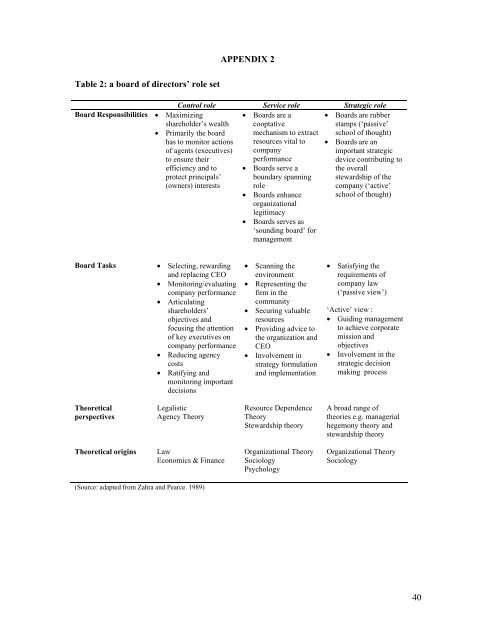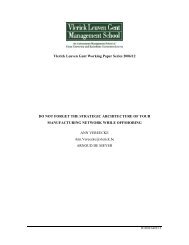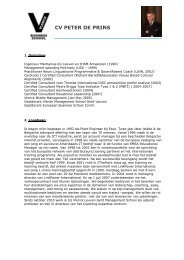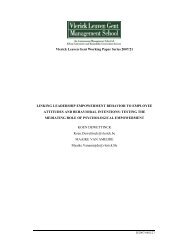Vlerick Leuven Gent Working Paper Series 2007/03 ... - Vlerick Public
Vlerick Leuven Gent Working Paper Series 2007/03 ... - Vlerick Public
Vlerick Leuven Gent Working Paper Series 2007/03 ... - Vlerick Public
You also want an ePaper? Increase the reach of your titles
YUMPU automatically turns print PDFs into web optimized ePapers that Google loves.
APPENDIX 2<br />
Table 2: a board of directors’ role set<br />
Control role Service role Strategic role<br />
Board Responsibilities • Maximizing<br />
shareholder’s wealth<br />
• Primarily the board<br />
has to monitor actions<br />
of agents (executives)<br />
to ensure their<br />
efficiency and to<br />
protect principals’<br />
(owners) interests<br />
• Boards are a<br />
cooptative<br />
mechanism to extract<br />
resources vital to<br />
company<br />
performance<br />
• Boards serve a<br />
boundary spanning<br />
role<br />
• Boards enhance<br />
organizational<br />
legitimacy<br />
• Boards serves as<br />
‘sounding board’ for<br />
management<br />
• Boards are rubber<br />
stamps (‘passive’<br />
school of thought)<br />
• Boards are an<br />
important strategic<br />
device contributing to<br />
the overall<br />
stewardship of the<br />
company (‘active’<br />
school of thought)<br />
Board Tasks<br />
• Selecting, rewarding<br />
and replacing CEO<br />
• Monitoring/evaluating<br />
company performance<br />
• Articulating<br />
shareholders’<br />
objectives and<br />
focusing the attention<br />
of key executives on<br />
company performance<br />
• Reducing agency<br />
costs<br />
• Ratifying and<br />
monitoring important<br />
decisions<br />
• Scanning the<br />
environment<br />
• Representing the<br />
firm in the<br />
community<br />
• Securing valuable<br />
resources<br />
• Providing advice to<br />
the organization and<br />
CEO<br />
• Involvement in<br />
strategy formulation<br />
and implementation<br />
• Satisfying the<br />
requirements of<br />
company law<br />
(‘passive view’)<br />
‘Active’ view :<br />
• Guiding management<br />
to achieve corporate<br />
mission and<br />
objectives<br />
• Involvement in the<br />
strategic decision<br />
making process<br />
Theoretical<br />
perspectives<br />
Legalistic<br />
Agency Theory<br />
Resource Dependence<br />
Theory<br />
Stewardship theory<br />
A broad range of<br />
theories e.g. managerial<br />
hegemony theory and<br />
stewardship theory<br />
Theoretical origins<br />
Law<br />
Economics & Finance<br />
Organizational Theory<br />
Sociology<br />
Psychology<br />
Organizational Theory<br />
Sociology<br />
(Source: adapted from Zahra and Pearce. 1989)<br />
40










